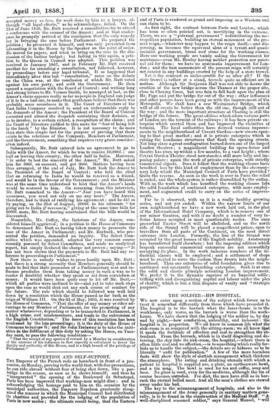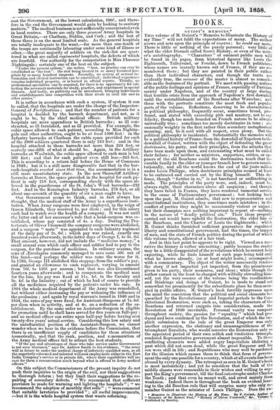THE SOLDIER—HIS HOSPITAL.
WE now enter upon a section of the subject which forces us to treat it somewhat differently from those which have preceded it. The hospital is to the barrack what the lazar-house is to the workhouse only worse, as the barrack is worse than the work- house. We have shown that the lodging of the soldier is, by day and by night,—how comfortless, unhealthy, and indecent : the
i
hospital is n proportion. We all know in common life what the sick-room is as compared with the sitting-room; we all know t4at it needs the fortitude of affection and zeal to strengthen the at- tendant. From the barrack, which is in itself disgusting and de- terring, the step into its sick-room, the hospital,—where there is often little zeal and no affection,—is to something which really for- bids us to handle the subject,—the details are so hideous as to be literally "unfit for publication." A few of the more harmless facts will show the style of sluttish management which thickens the atmosphere. The eating and drinking utensils with which a patient in hospital is supplied are, a plate, an earthenware bowl, and a tin snug. . The bowl is used for tea and coffee soup and beer. No glass as used, even for the medicine although the tin of course becomes corroded. For diet, the men have still as in bar- rack the eternal boiled meat. And all the man's clothes are stowed away under his bed. The key to the mismanagement of hospitals, and also to the mismanagement of the Army generally in sanitary matters gene- rally, is to be found in the construction of the 114dioal Staff. "A well-disciplined seasoned soldier," says General Mansel,' "will
cost the Government, at the lowest calculation, 100/., and there- fore in the end the Government would gain by looking to sanitary matters." The medical business is not sufficiently concentrated even in local centres. There are only three general Army hospitals in Great Britain,—at Chatham, Dublin, and Cork ; and the Last of these three is on the most limited scale. As the general hospitals are totally inadequate to the want,—for more than one-tenth of the troops are continually labouring under some kind of illness or other,—the great majority of soldiers on the sick-list are quar- tered in what are called regimental hospitals, the defects of which are fourfold. Our authority for the computation is Miss Florence Nightingale ; certainly one of the best on the subject.
"Under the present system," she writes, "first., no practice can ever be established as the best ' : the sick being treated in so many hundred hos- pitals by as many hundred surgeons. Secondly, no system of mutual in- formation and clinical instruction can be established ; individual experience remains individual property, or is buried in official reports. Thirdly, no professional specialties can be aoquired, for there is no opportunity for col- lecting the necessary materials for study, practice, and experiment in special diseases. And lastly., no publicity can be introduced, bringing individuals and establishments into competition with their rivals in civil life and in other armies."
It is rather in accordance with such a system, if system it can be called, that the hospitals are under the charge of the Inspector- General of ForVcations ; and that the number of patients for a hospital is decided by the barrack department, and not, as it ought to be, by the chief medical officer. British military hospitals are mere appendices to British barracks ; SS ill con- structed, as ill furnished, and as ill provided. For example, the cubic space allowed to each patient, according to Miss Nightin- gale and other authorities, ought to be at least 1500 feet : in the Infantry barracks at Chatham the cubic space provided for each of the 2800 soldiers quartered there is only 243 feet ; and in the hospital attached to these barracks not more than 324 feet, or scarcely one-fifth of what it should be. Again, in the Artillery barracks at Woolwich, the cubic space allowed to each man is but 369 feet ; and that for each patient even still less-243 feet. This is according to a return laid before the House of Commons in 1848; but it is a still more disagreeable fact that in the bar- rack-hospitals erected since that time the accommodation is in a still more unsatisfactory state. In the new Shorncliff Artillery barracks at Dover, the space provided. in the hospital for each pa- tient is only 218 feet, corresponding closely with the space al- lowed in the guardrooms of the St. John's Wood barracks-232 feet. And in the Kensington Infantry barracks, 270 feet, or all about one-seventh of the quantity of air a man ought to have. Our Government seems to think, and in fact always has thought, that the medical staff of the Army is a superfluous insti- tution. When Army surgeons were first employed, in the reign of Queen Elizabeth, they received is. per diem ; and for this salary each had to watch over the health of a company. It was not until the latter end of her successor's rule that a head-surgeon was es- tablished, whose pay consisted of 48. a day. During the Pro- tectorate of Oliver Cromwell the company surgeons were abolished, and a surgeon "mate" was appointed to each Infantry regiment at the daily pay of 2s. 6d. ; which pay was raised, exactly one hundred years afterwards in the latter days of George I, to 38. 6d. That amount, however, did not include the "medicine money," a small annual sum which each officer and soldier had to pay to the surgeon' for the purchase of medicines. In ordinary seasons, the sons of 2Esculapius commonly managed to save some 501. out of this fund—and perhaps the soldier was none the worse for it. In 1783, George III abolished this stoppage from the soldier's pay, and granted an allowance to each regiment, varying in amount from 70/. to 1201. per annum ; but that was also discontinued fourteen years afterwards ; and to compensate the medical man for the loss, his pay was fixed at 1 ls. 4d. in the Cavalry and 9s. 4d. in the Infantry ; out of which he had of course to provide all the medicines required by the patients under his care. In 1804 the whole medical department of the Army was remodelled, but without either increasing the pay or widening the influence of the profession ; and again by royal warrants issued in 1840 and in 1854, the rates of pay were fixed, for Assistant-Surgeons at Is. 6d. per diem when in activity, and at 48. on a reduction of the es- tablishment. By the same order no Assistant-Surgeon is eligible for promotion until he shall have served for five years on full-pay ; and no medical officer can retire upon half-pay before having seen twenty-five years' actual service. Considering this low salary and the '-uninfluential position of the Assistant-Surgeon, we cannot wander when we hear in the evidence before the Commission, that there is an insufficient supply of candidates for these situations numerically, and that the rank, position, and rammeration of the Army medical officer fail to attract the best students.
"If the pay and advantages of those who take service under Government is not soon increased," says Dr. Andrew Smith in his evidence, "the army will in future be under the medical charge of inferiorly-qualified men, as all the superiorly-educated and talented will seek employment eitharin the East India Company's service or in private life, where their capabilities will in- sure for them a remuneration much beyond what is offered to Army medical officers."
On this subject the Commissioners of the present inquiry do not push their inquiries to the origin of the evil, nor their suggestions to thorough reform ; but they limit their suggestions to the re- pairing of secondary defects. "We recommend that .sufficient provision be made for warming and lighting the hospitals" ; "we recommend the adoption of monthly diet rolls" ; "were commend that suitable lavatories be provided " ; all useful improvements, —but it is the whole hospital system that wants reforming.



























 Previous page
Previous page